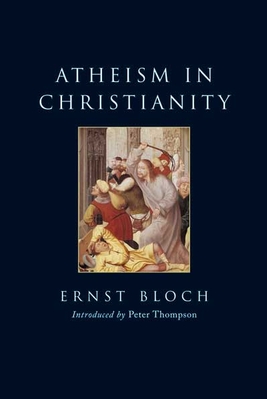
The very title of this book is a challenge to our current, increasingly caricatured “God debate”. Its central thesis, that Christianity has atheism at its very heart, was typically audacious for Ernst Bloch. Unlike his comrades and contemporaries such as Walter Benjamin or Theodor Adorno, this German leftist thinker rarely finds himself on syllabuses, and he is seldom read today. His first book, 1918’s Spirit of Utopia, helps explain why – a pile-up of apocalyptic theology, modernist poetics and political agitation that caught the fervent mood of the revolutions that followed the First World War.
After this explosive but impenetrable debut, Bloch’s work on politics, art and theology became somewhat calmer, although always retaining the angularity and force of Expressionism, a movement in painting which he famously championed in a debate with his fellow Marxist critic Gyorgy Lukacs, for whom this art was a mere symptom of a chaotic society – for Bloch, its ferocity and intensity pointed to a way out of that society. Bloch favoured the kind of unskilled, untutored creativity that would later be called “outsider art” and attempted to uncover the latent revolutionary, utopian content of everything from folk tales to Beethoven, while retaining a strident socialism that unsurprisingly led to exile from Germany in the 1930s.
After that Bloch spent time in the USA, then returned to (East) Germany – which he left within a whisker of being trapped there by the Berlin Wall. Atheism in Christianity was published in 1968 by an octogenarian Bloch, and is a fine introduction to his work – by this point he’d become a coherent, lucid writer, although the intensity still fairly burns off the page.
The first thing you notice is that the cosy certainties of our current debates are thrown into disarray. The Bible is full of “fairy stories”? For Bloch, that’s exactly the source of its power. For him, fairytales are a repository of proletarian wisdom, explicitly opposed to the wisdom of the powerful - “to speak in a modern way, most fairytales have something Chaplinesque in them”. The fairytale is a story that comes from “the people”, against “the feudalism of the saga and the despotism of the myth” – and so too with the Bible. Bloch was adept at finding latent utopianism in the most unexpected places. The Bible’s structure of beginning, middle and end, derided as a consolatory bedtime story, becomes an example of its profound humanism, a claim that history is mutable and changeable – history is “no longer the simple ebb and flow of eternally repeated incidents, as even the Greek historians thought of it”, but something in which man can intervene. And rather than being a spiteful fantasy of burning unbelievers and the ascending faithful, it is the notion of apocalypse that is the Bible’s most important gift to history, giving us a conception of futurity, urgency and the possibility of a world transfigured – “a profound wakefulness to the future” rather than an opiated sleep is its subversive heart.
How, then did the Bible come to be used to mystify and subjugate for so long? Bloch’s answer is that the Bible contains two parallel strains – an apologia for the “On-High”, with God as Lord and despot, and another strain based around dissent, argument, rooted in the lower classes rather than the priesthood. In short, one is the God of Martin Luther and the Papacy, the other is the God of William Blake and the Levellers, which contains within it the promise that God will be replaced by Man. To uncover this other strain necessitates what Bloch unashamedly calls “detective work”, with attention to certain points of tension and disputation – the revolutionary rage of Isaiah, the Exodus from slavery, and the feud between man and God in the Book of Job, whose eventual message for Bloch is that “man can be better, and behave better, than his God.” Meanwhile, the New Testament is read not as a Gandhian ethics of passive resistance, but the first irruption of socialism into history, with Jesus as Son of Man, not of God, “come to cast fire upon the earth” and particularly upon the rich, telling his disciples that the Kingdom of Heaven is “in the midst of you”, not up in the sky – subsequently “redacted” and sanitised by St Paul.
Bloch seems less to argue for an atheism within Christianity than for atheism as its (il)logical conclusion. His atheism is inseparable from the idea of “concrete Utopia” – yet before the knee-jerk Marxism-as-religion response can step in, we find Bloch conflating the Pharisees, the Stalinists and business: “‘it is written’, ‘the party is always right’, ‘a gentleman’s word is his bond’. None of it will stand up to a single jolt of thought.” Bloch argues that a serious atheism must not be allowed to become “triviality” or “nihilism” (you can find both in the bus-borne plaint “stop worrying and enjoy your life”). Atheism in Christianity contends that the raging prophets were more the friends of humanity than the “positivist eunuchs” of official atheism – and the case for prophecy and rage is made amply in this heady, dizzying book. You can hear Terry Eagleton cheering.

